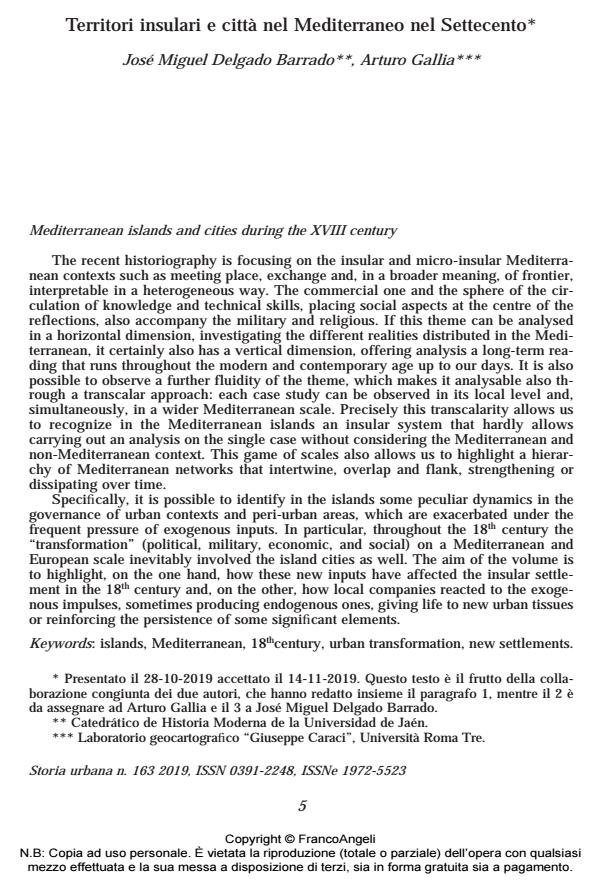Mediterranean islands and cities during the XVIII century
Journal title STORIA URBANA
Author/s José Miguel Delgado Barrado, Arturo Gallia
Publishing Year 2020 Issue 2019/163
Language Italian Pages 9 P. 5-13 File size 38 KB
DOI 10.3280/SU2019-163001
DOI is like a bar code for intellectual property: to have more infomation
click here
Below, you can see the article first page
If you want to buy this article in PDF format, you can do it, following the instructions to buy download credits

FrancoAngeli is member of Publishers International Linking Association, Inc (PILA), a not-for-profit association which run the CrossRef service enabling links to and from online scholarly content.
The recent historiography is focusing on the insular and micro-insular Mediterranean contexts such as meeting place, exchange and, in a broader meaning, of frontier, interpretable in a heterogeneous way. The commercial one and the sphere of the circulation of knowledge and technical skills, placing social aspects at the centre of the reflections, also accompany the military and religious. If this theme can be analysed in a horizontal dimension, investigating the different realities distributed in the Mediterranean, it certainly also has a vertical dimension, offering analysis a long-term reading that runs throughout the modern and contemporary age up to our days. It is also possible to observe a further fluidity of the theme, which makes it analysable also through a transcalar approach: each case study can be observed in its local level and, simultaneously, in a wider Mediterranean scale. Precisely this transcalarity allows us to recognize in the Mediterranean islands an insular system that hardly allows carrying out an analysis on the single case without considering the Mediterranean and non-Mediterranean context. This game of scales also allows us to highlight a hierarchy of Mediterranean networks that intertwine, overlap and flank, strengthening or dissipating over time. Specifically, it is possible to identify in the islands some peculiar dynamics in the governance of urban contexts and peri-urban areas, which are exacerbated under the frequent pressure of exogenous inputs. In particular, throughout the 18th century the "transformation" (political, military, economic, and social) on a Mediterranean and European scale inevitably involved the island cities as well. The aim of the volume is to highlight, on the one hand, how these new inputs have affected the insular settlement in the 18th century and, on the other, how local companies reacted to the exogenous impulses, sometimes producing endogenous ones, giving life to new urban tissues or reinforcing the persistence of some significant elements.
Keywords: Islands, Mediterranean, 18thcentury, urban transformation, new settlements.
- Livorno, los Corsos y un caso de tolerancia al contrabando de guerra en el complicado juego político-diplomático de la década de 1730 Paolo Calcagno, in Cuadernos de Historia Moderna /2022 pp.509
DOI: 10.5209/chmo.81683
José Miguel Delgado Barrado, Arturo Gallia, Territori insulari e città nel Mediterraneo nel Settecento in "STORIA URBANA " 163/2019, pp 5-13, DOI: 10.3280/SU2019-163001